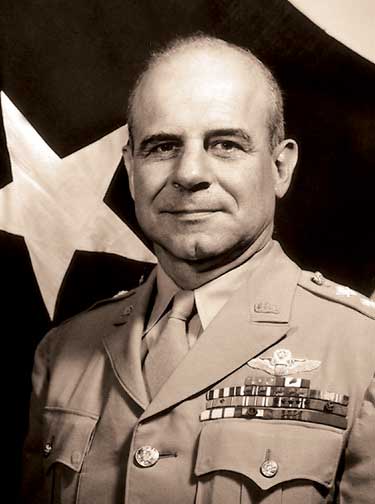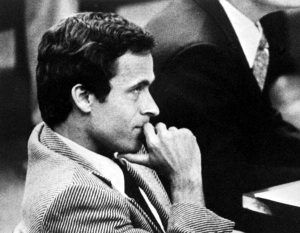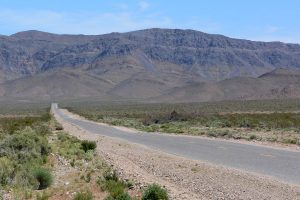The United States’ entrance to World War II was sudden and unexpected, and Americans were stunned by the Japanese sneak attack at Pearl Harbor. While the Germans had attacking Poland, France, and Great Britain in the years just prior to Pearl Harbor, the U.S. had remained technically neutral, and isolationist, but some American leaders believed that the day would come when U.S. involvement would be necessary. Japan’s attack on Pearl Harbor on December 7, 1941 completely united American resolve. Japan’s sneak attack succeeded in removing much of the U.S. naval and aviation power in the Pacific. The Japanese had about six months of initial success at expansion in the Pacific, and then the United States began to turn things around. The turning point was the Battle of Midway in June 1942; but something occurred shortly before Midway that may have been a turning point of a different sort: the Doolittle Air Raid on Tokyo.1
The Doolittle Air Raid’s namesake comes from James Harold Doolittle, an army pilot, and so much more. Doolittle’s early biography includes boxing and motorbiking, signifying his daring nature, something that he retained all through his life. As a young adult, Doolittle went to the University of California, Berkeley to obtain a degree in engineering, but dropped out to join the Army as a 2nd Lieutenant to become a pilot. His beginnings in the army were not specifically spectacular, as he did not even fly overseas during World War I, but his skill in an aircraft was quite the opposite of his army beginnings. He began air racing, and was exceptional, winning many events and setting new records with almost every win. Doolittle was also involved in the advancement of the safety of aviation, by involving many different instruments in flight. Doolittle was eventually awarded a degree from the University of California, Berkeley, and went on to study at the Massachusetts Institute of Technology, to further his engineering and aeronautics interests. During his study, he was still an active pilot, helping to pave the way for other pilots, which also helped him earn his degree. With multiple degrees and a background in aircraft racing, Doolittle was awarded a few medals and was seen as one of America’s most experienced pilots before the age of thirty. Despite this, Doolittle wanted a higher income, and so he resigned from the army and began working for the Shell Oil Company. This didn’t last long; World War II began. Doolittle requested to be reinstated in the Army.[2. Encyclopedia of World Biography, 2004, s.v. “James Harold Doolittle;” The Scribner Encyclopedia of American Lives, 1991-1993, s.v. “Doolittle, James Harold,” by George M. Watson, Jr..]

Upon returning to the army, Doolittle was quickly recruited for the Pearl Harbor Revenge Plan: the bombing of Tokyo. Fueled by patriotism and passion, many leaders in the United States Army wanted to perform a raid on Japan’s mainland. However, because Japan was much more prepared for an attack than the United States had been for Pearl Harbor, there were many problems with a mainland raid. For one, the planes could not make it from a land base all the way to Japan, as they would just run out of fuel. Second, aircraft carriers could not get close enough to Japan to give the planes a shorter route so that they would have enough fuel, because Japan’s navy was quite large and spread out at this time of the war. Third, who would lead this attack and train the men to perform such a raid? And would it all be worth it?
Doolittle and others came up with a plan that would use America’s medium B-25 bombers, which could make the flight, starting from aircraft carriers. The aircraft carriers would not have to be dangerously close to Japan’s navy. Still, however, another problem was raised; the bombers would not be able to return to the aircraft carriers. So Doolittle and his team came up with the idea that after the raid, the pilots would land in United States’ ally China’s territory, and the planes would be given to the Chinese military. Furthermore, Doolittle was able to convince his superiors in the Army Air Corps to allow him to lead the raid. He began training the pilots that would fly these fairly new planes. The aircraft carriers then went out to sea, and because they were spotted early, the planes took off from the carrier Hornet on April 18, 1942, and the raid commenced.2

The damage to Tokyo from the raid was quite small. In fact, the raid netted about even in losses on both sides. Japan had about 50 Japanese killed and 400 injured with a few aircraft shot down and some patrol boats sunk. This does not nearly equal the damage done at Pearl Harbor, which was what the U.S. was avenging. Furthermore, all but one of the planes that were used in the raid were heavily damaged, and three of the members involved were killed, and eight were captured. Most of the men involved did make it to China, despite their aircraft being heavily damaged. Doolittle was included in the survivor pool. Although the aforementioned damage to the Japanese and observable contribution to the war wasn’t very significant, the way this raid played on both Japanese and American morale and emotions cannot be overstated. Both of these countries were very patriotic, and the Japanese did not like losing at all. In fact, they would rather commit suicide than surrender, as was demonstrated in the later phases of the Pacific war. Although the Japanese didn’t necessarily lose very much, they felt as if they could not defend their homeland, that they had lost, and their pride was weakened. But the event played a similar, positive role on the Americans, as they felt like they finally were on the offensive, and weren’t just recovering from Pearl Harbor anymore.3

This raid was vital to the strategic impact on the war. To defend their land, the Japanese recalled aircraft that were set up near Midway and other islands, opening up this area for the Americans to advance. The later Battle of Midway was very successful, as the Japanese ended up losing four aircraft carriers, the most important naval units during World War II, and pushed the Japanese away from Midway and various other islands. This battle only strengthened both of the aforementioned psychological impacts of the Doolittle Raid and began to turn the war in the United States’ favor.4
Doolittle received recognition for his raid and overall efforts in the war. He was granted two promotions, which classified him as a brigadier general, and was granted the Congressional Medal of Honor, which is the highest military award. Doolittle then served under General Dwight Eisenhower in a planned invasion of Africa. Unlike many others, Eisenhower didn’t immediately hold Doolittle in high regard; but eventually Doolittle’s prowess won over his superiors. Doolittle had much success here as well. Doolittle was again promoted, this time to a major general. Doolittle was prolific after this, but he didn’t do anything extremely extravagant, but still performed many campaigns that contributed to the war effort. Later, he was promoted to lieutenant general.5
When the war was coming to a close, Doolittle had gone through multiple ranks in the military, and let his namesake raid and various other missions generate for him quite the fame and helped boost the morale of the American people. After the war, Doolittle served in the reserves, and returned to the Shell Oil Company, where he worked up the ranks, much as he had in the army, and he became vice president. From time to time, Doolittle would take breaks and do some private work for the government. Doolittle’s skill and background made him a very sought after adviser, particularly when it came to aviation, war, and strategy. Doolittle had married a little before the war, and had two sons. After retiring from Shell, one of Doolittle’s sons committed suicide, which, despite all of his wartime efforts, the loss of his son could be assumed to be his most difficult battle. Later on, his wife passed away. Near the end of Doolittle’s life he was still awarded various medals, with the Presidential Medal of Freedom ranking the highest. With this medal, Doolittle had received both the highest military and civilian medals. This was truly spectacular. Doolittle died five years after his wife, in his sleep, at the age of ninety-six.6
James Doolittle led a life that was very adventurous, meaningful, and important in terms of his country. He successfully led a raid that not only raised American spirits in a time when they were low, but also diminished the enemy’s. Furthermore, his numerous contributions in the world of aviation cannot be overstated, and his prowess with a plane cannot be compared.
- Gale Encyclopedia of U.S. History: War, 2008, s.v. “World War II (1939-1945).” ↵
- Encyclopedia of World Biography, 2004, s.v. “James Harold Doolittle;” The Scribner Encyclopedia of American Lives, 1991-1993, s.v. “Doolittle, James Harold,” by George M. Watson, Jr.; Gale Encyclopedia of U.S. History: War, 2008, s.v. “World War II (1939-1945).” ↵
- Gale Encyclopedia of U.S. History: War, 2008, s.v. “World War II (1939-1945).” ↵
- Gale Encyclopedia of U.S. History: War, 2008, s.v. “World War II (1939-1945).” ↵
- Encyclopedia of World Biography, 2004, s.v. “James Harold Doolittle”; The Scribner Encyclopedia of American Lives, 1991-1993, s.v. “Doolittle, James Harold,” by George M. Watson Jr. ↵
- The Scribner Encyclopedia of American Lives, 1991-1993, s.v. “Doolittle, James Harold,” by George M. Watson Jr.; Encyclopedia of World Biography, 2004, s.v. “James Harold Doolittle.” ↵



43 comments
Rawan Hawsawi
Thorough research always leads to a more reliable and flowing narrative. In the story, the author delves deep into the adventurous younger life of James Doolittle and carefully positions it with the raid on Tokyo. He is presented as a thoughtful leader with unmatched zeal for leadership and American victory. The thorough research conducted by the author creates a unique understanding of Doolittle’s desire to lead the raid.
Iris Reyna
Good job on the article Cameron, it was informative and educational and was put together nicely. I knew nothing of the Doolittle raid or Doolitle at all before reading this article. It did a good job of showing who James Doolittle was and the effect he had on America and it’s history. You did a good job with the timeline of his life, showing who he was and the determination he had an a pilot and war hero and everything elese leading up to the war, good job.
Danielle Rangel
This was an article topic that I’ve never heard of so it was very interesting to read. I never knew that a pilot named DooLittle conducted a raid that impacted the war. I think it is interesting that the author notes his daring personality and behavior. The context of the protagonist’s nature allows for great background on the main topic. Overall I think it was an interesting read and I learned about something I didn’t have previous knowledge on.
Griffin Palmer
One of the things I thought this article did great at was showing the pain a soldier can go through not just in war but in life outside the war and how it can have an effect on a soldier. Doolittle is a great example of this who would gain emotional motivation along with many other soldiers involved in the Pearl Harbor revenge plan.
Guiliana Devora
Doolittle is an exceptional man with a lot of courage and bravery. To think that he was able to do all that he did and survive is amazing. I think it is crazy how in the beginning he was doing poorly in the army, but his skill in an aircraft was what got him his recognition, and he was able to exceed in that field. I feel like he proves that everyone is able to do extraordinary things, they just have to find what they are good at.
Hunter Stiles
Congrats on the publication of your article!!
It was comforting to read about the numerous people who contributed to this battle’s victory after knowing about what occurred at Pearl Harbor. While I was unaware of James Doolittle before to this, I was inspired by his efforts as a pilot to defend our nation during the Second World War. He was a courageous man, and I value those who fight for and give up their lives for us so that we might enjoy better lives. Prior to World War II, he accomplished extraordinary things and planned for every conceivable scenario. Upon reading that one of his sons had committed suicide, he had to fight through it to make him proud. It was one of the hardest fights he had to face. I can’t even begin to fathom the suffering Doolittle went through after losing his child. But, Doolittle persisted in fighting through it to honor his kid; it was genuinely inspirational.
An outstanding read!
Madison Magaro
This was a very well written article about James Doolittle. Doolittle Air Raids was named after him because he was such a good pilot. He was apart of the Pearl Harbor Revenge Plan to bomb Tokyo. It is sad to hear about how one of his sons committed suicide and he had to go through that pain and still fight for our country. Overall this was a great article that gave me more insight on what kind of person Doolittle was.
Olivia Gray
This is a very well written article and was very inserting to read. I have never heard of James Doolittle, but I think it’s amazing how he risked his life at war as a pilot.It was sad to read about his son committing suicide. I cannot imagine the pain Doolittle went through because of the loss of his son. But Doolittle did not give up and continued to fight through it to make his son proud.
Danielle Sanchez
This article was well written! Doolittle Air Raids was named after James Harold Doolittle who was an army pilot. During his return to the army he was recruited for the Pearl Harbor Revenge Plan which entailed the bombing of Tokyo. Doolittle would come up with a plan that would use America’s medium B-25 bombers. The damage to Tokyo from the raid was small.
Andrea Tapia
After, learning about what happened at Pearl Harbor it was nice to know the many people that helped win this battle. I didn’t know who James Doolittle was before, but I was impressed with his efforts to fight for our country during wartime as a pilot. He is someone who was very brave and I appreciate the people who fight for our people who sacrifice for us to live a better life. Everything that he did prior to WWII was extraordinary and was prepared for anything that could have happened in the future. When reading about the fact that one of his sons committing suicide was one of the biggest battles he had to face, but fought through to make him proud. The fact that he also got to work with Eisenhower was incredible. I have so much respect for James and the great impact he made in American History.